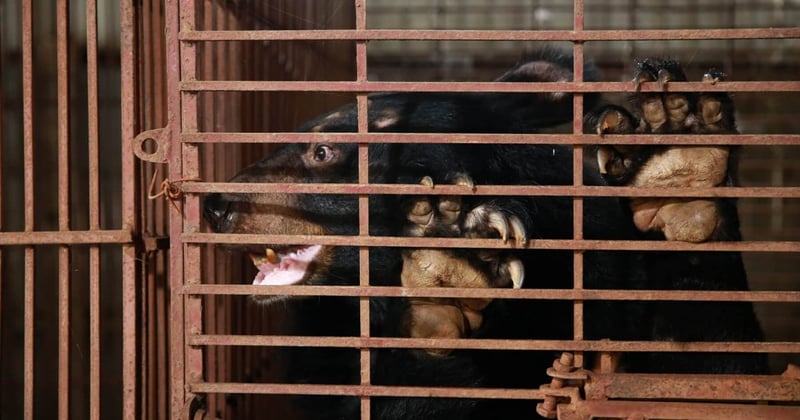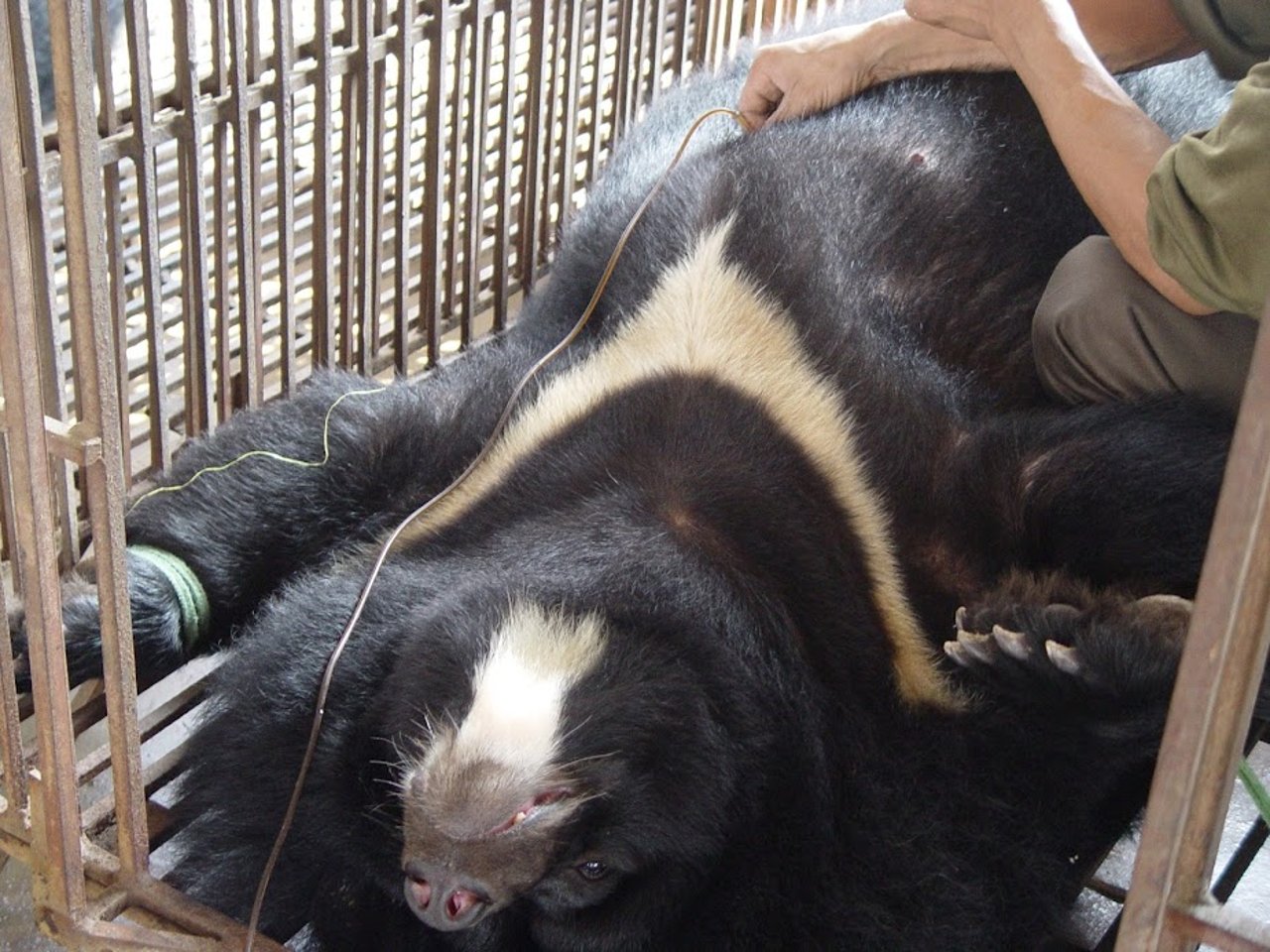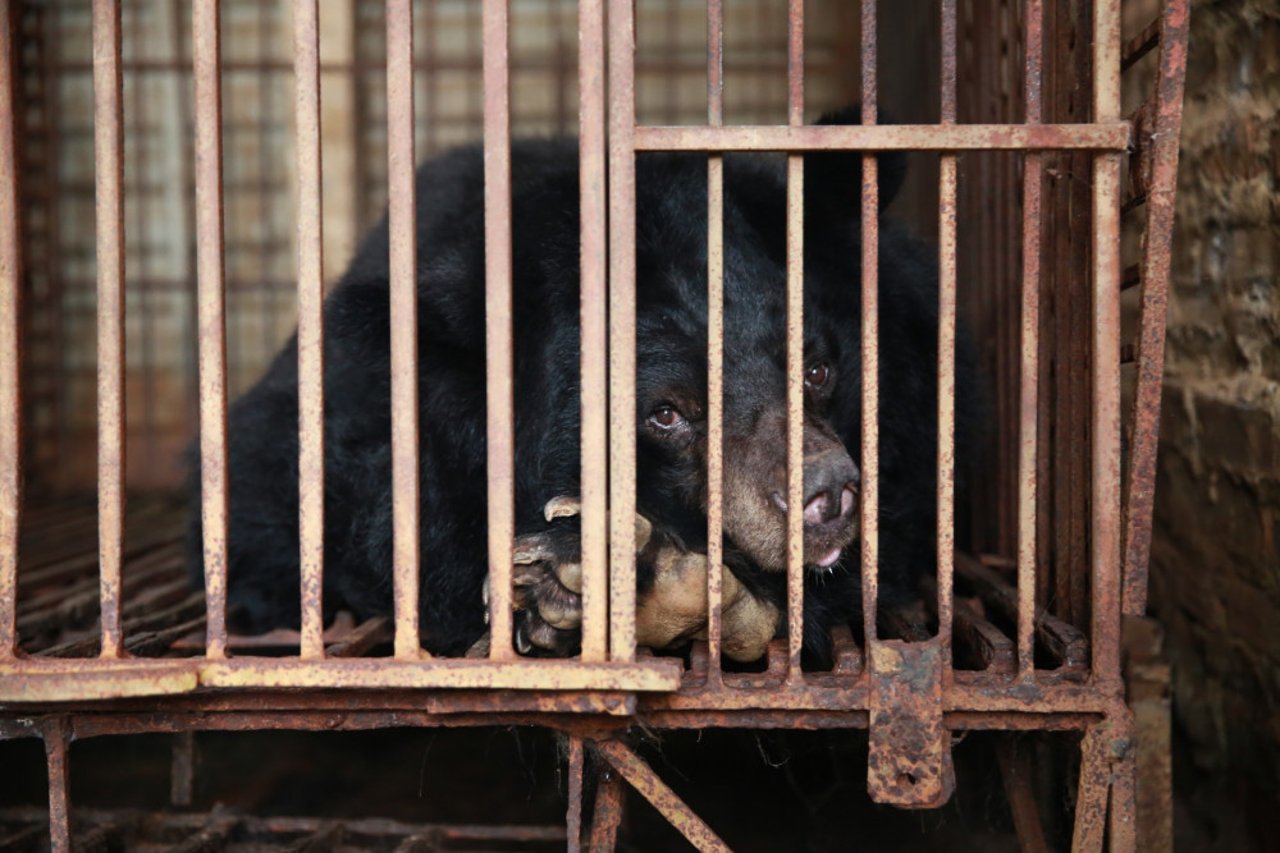
A day in the life of a bear on a bear bile farm
Blog
The life of a bear on a bear bile farm is tragic. These animals endure a relentless cycle of pain and suffering.
Bear bile farming, a controversial and inhumane practice, remains a critical issue in some parts of the world, particularly in Asia. These farms are established to extract bile from bears, which is used in Traditional Asian Medicine.
Unfortunately, the life of a bear on such farms is marked by unimaginable suffering.
Morning: another day of agony begins
The day begins with a stark contrast to the bear's natural habitat. Instead of waking up in a forest and starting the day with exploration and play, a bear on a bile farm is confined to a small, cramped cage. These cages are often so tiny that the bears can barely move, let alone stretch their bodies or engage in any form of natural behaviours.
These bears are often put into a cage as a young cub and remain caged until they die or are slaughtered. While some bears die young at around 5-years old, some endure this torture for up to 20-years or more. During this time, they are often deprived of natural sunlight, lethargic, in distress, and showing abnormal behaviors.
Breakfast: a gruesome routine
Breakfast for a bear on a bile farm is nothing like the foraging for fruits, fish, or other natural food sources they would have in the wild. Instead, they are fed a monotonous diet, typically consisting of rice gruel, vegetables, cereals, and fishmeal. The diet is inadequate in nutrients, often leading to malnutrition and a host of health problems.
But the most agonizing part of their morning routine comes when it's time for bile extraction.
Bile extraction: the pinnacle of suffering
The primary reason for the existence of bear bile farms is to harvest bile from the gallbladders of these unfortunate animals. This bile is used in Traditional Chinese Medicine, despite the availability of synthetic and other humane alternatives.
Bear bile is often extracted without any anesthetic, which can make the process extremely painful. A large needle is inserted deep into their body to extract bile through an open wound permanently created in their belly.
This process is not only physically excruciating but also leads to chronic infections and lifelong suffering. Even though some efforts have been made to improve extraction methods, the pain and suffering endured by these bears remain significant.
The bears on these farms may undergo bile extraction multiple times a day, every day of their lives. This ongoing torture takes a devastating toll on their physical and mental well-being.
A bear getting their bile extracted on a farm in Vietnam.
Afternoon: a life of misery
The remainder of the day is no better for the bears. They are left to languish in their cramped cages, unable to express their natural behaviors. With no enrichment, no opportunity to roam, and no mental stimulation, their lives are marked by unrelenting suffering.
Evening: a lonely night
As night falls, the bears continue to endure their life of isolation and torment. The absence of social interaction and the constant pain from bile extraction takes a severe toll on their psychological well-being. These animals, known for their intelligence and emotional depth, are reduced to mere shells of their natural selves.
Photo: World Animal Protection / Nguyen Van Tuyen
Bears are sentient beings who are able to feel a range of emotions and feelings, including pain, pleasure and fear. They are not a commodity for profit. There is simply no excuse for the pain and suffering the bear bile industry inflicts on these innocent animals. With plant-based and synthetic alternatives to bear bile available on the market that have been proven effective for use in traditional medicine, it is a pointless practice as well as a cruel one.
We need your support to increase awareness of humane alternatives to bear bile and other wildlife products. We are working in China to encourage Tradtional Chinese Medicine practitioners and consumers to shift towards kinder, equally effective alternatives. And, with our history of success in South Korea and Vietnam, and thanks to donors like you, we know this important change is possible.
Giving bears a chance
Together, we have the power to advocate for a breeding ban, ensuring that the current captive bears are the last generation to suffer such horrors. And with the support of caring animal-lovers like you, we can work towards providing natural sanctuary environments, where these bears can begin to heal physically and emotionally.
You can give bears the best gift of all this holiday season — a life they truly deserve. When you give today, you’ll have 2x the impact as every gift is matched*. Every dollar raised this season brings us closer to ending the bear bile farming industry for good.
Double your impact for bears today!
*Donations will be matched up to $180,000 until midnight December 31, 2023, thanks to our generous lead match donors, Sakura’s Hope Foundation, The Alan and Patricia Koval Foundation, Anna Saroli, and several anonymous donors.
Banner photo: World Animal Protection / Nguyen Van Tuyen

